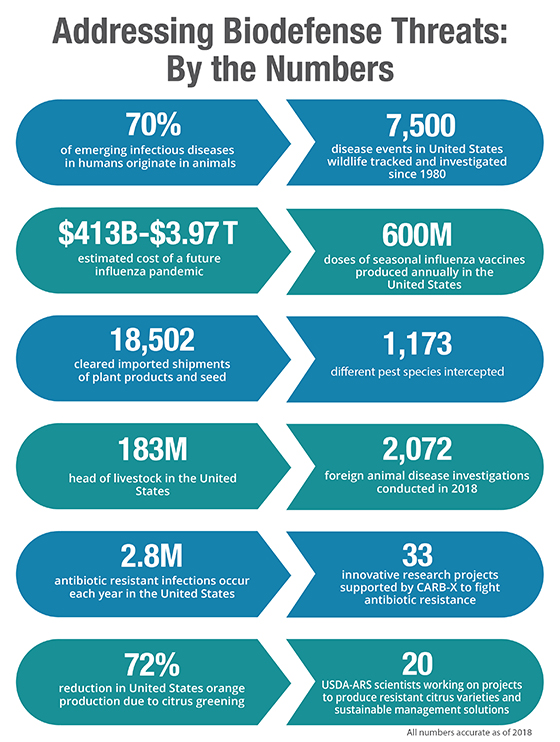NBS, NSPM-14, and Summary of the Year 1 Assessment
The NBS, released on September 18, 2018, provides a new and improved framework to enable better collaboration and cooperation across the federal government and with non-federal stakeholders. The Strategy sets the course for the United States to combat serious biothreats, arising from natural outbreaks of disease, accidents involving high-consequence pathogens, or the actions of terrorists, state, or lone-actors.
The NBS encompasses five goals for strengthening the biodefense enterprise:
- Enabling risk awareness to inform decision-making across the biodefense enterprise;
- Ensuring biodefense enterprise capabilities to prevent bioincidents;
- Ensuring biodefense enterprise preparedness to reduce the impacts of bioincidents;
- Rapidly responding to limit the impacts of bioincidents; and
- Facilitating recovery to restore the community, the economy, and the environment after a bioincident.

Figure 1: The effect of biodefense threats on U.S. health security and national security
and U.S. efforts to mitigate these threats.
Pursuant to NSPM-14, the Biodefense Steering Committee (BSC), chaired by the Secretary of Health and Human Services (HHS) and comprised of Cabinet members, is responsible for monitoring and coordinating NBS implementation. The Biodefense Coordination Team (BCT), currently led by the HHS Assistant Secretary for Preparedness and Response (ASPR), assists the BSC in overseeing and coordinating implementation of the Strategy. The BCT was established in December 2018 and meets weekly to coordinate NBS activities. The BCT also engages SLTT, the private sector, and international partners, as appropriate. Since the release of the Strategy and NSPM-14, federal agencies have:
-
Developed a Request for Information to collect data from 15 departments and their components and built a database to capture and analyze this data;
-
Completed a foundational assessment of the collected and compiled data; and
-
Performed an extensive after-action process and implemented changes for the second annual round of data collection and assessment.
In 2019, the federal government conducted an assessment of the biodefense enterprise, as directed in NSPM-14. The foundational assessment included a review of past efforts to address biological threats. The assessment indicated many of these efforts have yielded achievements in risk awareness, prevention of, preparedness for, response to, and recovery from bioincidents—whether naturally occurring, deliberate, or accidental in origin. Strengthening routine and emergency public health capabilities, along with technological advances such as new and improved vaccines, treatments, diagnostics, and the establishment of a more robust medical countermeasure (MCM) product pipeline, coupled with the enhanced ability to respond rapidly with a research response to emerging infectious diseases, have improved biodefense enterprise preparedness and response capacity and capabilities.
NSPM-14 mandates that each year, within 90 days of the approval of the assessment, the BCT shall summarize the assessment and prepare, subject to the approval of the BSC and in coordination with the National Security Council (NSC) staff, a public report describing the actions taken to reduce the risk of biological threats to the American people. The following section highlights efforts undertaken by federal agencies that reduce the risk of biological threats to citizens of the United States. These highlights are a representative sample of specific achievements and programs ongoing in 2018, the first year captured in NBS data collection. Many other activities are ongoing across the federal government to protect the United States from biological threats.
<< Previous ---------
Top of Page ---------
Next >>

